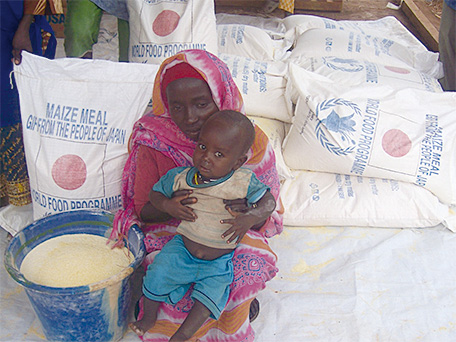Japan's Official Development Assistance White Paper 2012
(3) Food
According to the joint report from FAO, IFAD and the UN World Food Programme (WFP), the number of undernourished people has shown a downward trend since 1990, but the trend has slowed since 2007-2008 and an estimated 868 million people were suffering from chronic undernourishment between 2010 and 2012. That number is still high, and the need for food aid is increasing due to conflict, natural disasters and rising food prices. In addition, there is a need for international coordination and multifaceted measures to establish food security (guaranteeing the right of all people to sufficient food), such as ensuring social safety-net, improving nutrition, improving the balance of supply and demand thorough increasing food production, and measures against infectious diseases of livestock.
According to FAO, we are on track to achieve the MDG 1 of halving the percentage of the population suffering from starvation from the 1990 level by 2015 (23.2% to 11.6%) and the target will be achievable if the abovementioned actions continue to be taken thoroughly and appropriately (the level is 14.9% as of 2012).
<Japan's Efforts>
In light of these circumstances, Japan provides food aid based on requests from developing countries confronting food shortages. In FY2011, Japan provided a total of ¥4.9 billion in bilateral food aid to 13 countries.
In addition to that, Japan provides through WFP, emergency food aid, support for school meals programs that promote school enrollment and regular attendance, support for promotion of participation in work for development of agricultural land and social infrastructure to support the self-reliance of local communities. In 2011, Japan contributed a total of $281.86 million to WFP projects being implemented around the world.
Japan also supports the efforts of developing countries to enhance their own food safety. Japan reinforces countermeasures for animal infectious diseases in the Asia-Pacific region that expand beyond national borders, such as foot-and-mouth disease, in cooperation with the World Organization for Animal Health (OIE) and FAO, including the Global Framework for Progressive Control of Transboundary Animal Diseases (GF-TADs).
●Central African Republic
Food Aid for Internally Displaced Persons and Refugees from Sudan and the Democratic Republic of Congo
Voluntary Contribution to WFP (January - October 2011)
Japan cooperates with the UN World Food Programme (WFP) to provide food aid to people of the Central African Republic who have been forced to flee their homes but stay within the borders of their country because of frequent political unrest. Despite its abundant resources, the Central African Republic has a stagnant economy and poor infrastructure and is one of the poorest countries in the world. It is believed that there are 180,000 internally displaced persons (IDPs) and 140,000 refugees living in neighboring Chad and Cameroon. Agriculture is slumping and there is a serious shortage of food because so many people are separated from the land. The aim of this contribution is to rebuild and restore the lives of people affected by conflict, and support from Japan has propped up programs to enrich the diets of malnourished children under five years of age, pregnant and lactating women.
In addition, the Central African Republic is home to nearly 20,000 people who fled neighboring Sudan and the Democratic Republic of Congo for growing concern for their safety. Japan provides food for refugees' survival through WFP.
After refugee families arrive in camps and complete registration, they are given one month's worth of food including corn flour, beans, cooking oil and salt. Around 60,000 IDPs and 14,000 refugees have received food aid through Japan's assistance.
At the Fourth Tokyo International Conference on African Development (TICAD IV) in 2008, Japan pledged to intensify its cooperation for efforts in the agricultural and food supply sectors in African nations. Japan is making good on its pledge through this support.

Sudanese refugees who came to receive corn flour delivered through support from Japan. (Photo: WFP)
